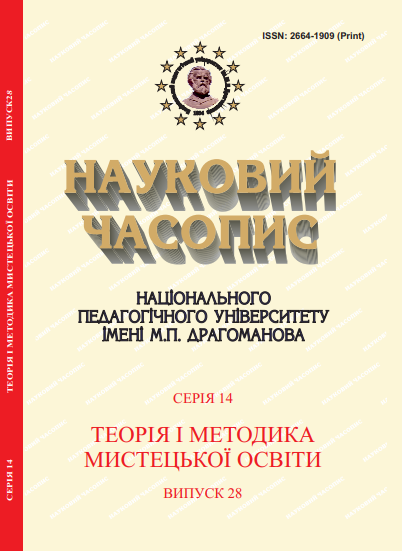Transfession training in higher arts education
DOI:
https://doi.org/10.31392/NPU-nc.series14.2022.28.01Keywords:
Art pedagogy, Transferable training, Faculty of arts, Theoretical approaches, Practical technologyAbstract
Important direction in the modernization of art pedagogy is the solution of the problem of transferable training of specialists in higher education institutions. Structural model presented in the article reveals possible directions of branching of art pedagogical education into performing, pedagogical, educational and sound directing aspects, highlights the basic principles and technological support of transfessionalization of art training of students, criteria and indicators of efficiency of transfusion training. Fundamental importance of functional-motivational, axiological, creative and reflexive factors of learning optimization emphasized. Particular attention paid to the practical direction of education on the basis of parallel implementation of informative and problem-solving teaching methods; to the use of direct interpersonal and electronic remote methods of communication between teachers and students; to the use of self-immersion techniques and at the same time to achieve communicative openness of future specialists. Emphasized that transferable training can be effective in terms of ensuring freedom of choice and at the same time involving students in the implementation of unified educational tasks. Promising directions of development and renewal of art pedagogy are such as research of methodological determinants of art education, problems of universalization of students' educational actions in the field of art, possibilities and prospects of application of distance educational technologies in teaching art disciplines, multicultural landmarks of art education development formation of personality in modern conditions.
Keywords: art pedagogy, transferable training, faculty of arts, theoretical approaches, practical technology.
References
Виноградова, Е. (2016). Транспрофессионалы – люди будущего? Uralstudent. http://www.uralstudent.ru/articles/career/2237349
Дикова, В. В. (2019). Ориентация на развитие как предиктор прогнозирования транспрофессионализма будущих педагогов. Материалы Всероссийской научно-практической конференции. С. 158-162. https://elar.rsvpu.ru/bitstream/123456789/28545/1/978-5-8295-0621-6_2019_045.pdf
Зеер, Э. Ф. (2017). Психолого-педагогическая платформа транспрофессионализма педагога профессионального образования. Профессиональное образование. Столица, 6, 5-10.
Кабрин, В. И. (2019). Становление потенциала креативного лидерства трансфессионалов в образовательных пространствах магистратуры. Педагогика и просвещение, 4, 86-97. https://nbpublish.com/library_read_article.php?id=30766
Козир, А. В. (2008). Професійна майстерність учителів музики: теорія і практика формування в системі багаторівневої освіти. НПУ імені М. П. Драгоманова.
Отич, О. (2010). Культурологічна педагогічна парадигма як методологічна основа сучасної освіти. Мистецька освіта: зміст, технології, менеджмент, 5, 232-242.
Падалка, Г. М. (2008). Педагогіка мистецтва (теорія і методика викладання мистецьких дисциплін). Освіта України.
Ткаченко, Н. А. (2016). Трансфессионализм и профессиональный потенциал молодежи. Успехи современной науки и образования, 9, 185-186.
Зеер, Э. Ф., Заводчиков, Д. П., Зиннатова, М. В., Буковей, Т. Д., & В. С. Третьякова. (2019). Транспрофессионализм субъектов социально-профессиональной деятельности.Рос. гос. проф.-пед. ун-та. http://elar.rsvpu.ru/978-5-8050-0668-6
Sleurs, W. (Ed.). (2008). Competencies for ESD (Education for Sustainable Development) teachers : a framework to integrate ESD in the curriculum of teacher training institutes. https://unece.org/fileadmin/DAM/env/esd/inf.meeting.docs/SC/SC-3/CSCTHandbookCompetencesESD.pdf
Roco, M., & Bainbridge, W. (2003). Converging Technologies for Improving Human Performance: Nanotechnology, Biotechnology, Information Technology and Cognitive Science. Kluwer Academic Publishers.
Downloads
Published
Issue
Section
License
Copyright (c) 2022 Nauk. čas. Nac. pedagogìčnogo unìv. ìm. M.P. Dragomanova, Ser. 14, Teor. metod. mistec. osv. [Scientific journal NPDU. Series 14. Theory and methodology of arts education]

This work is licensed under a Creative Commons Attribution-NonCommercial-NoDerivatives 4.0 International License.

